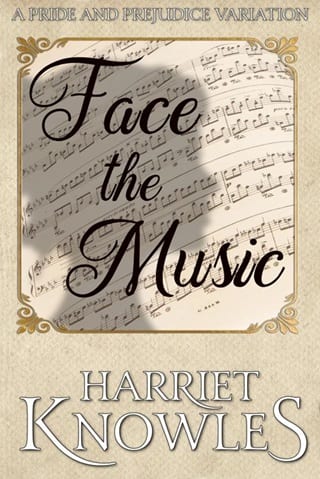Chapter 18
18
D arcy hurried upstairs to change after riding out with Bingley. He had seen the servants clearing a used place setting from the breakfast table, so Miss Elizabeth must have been down early, and he was berating himself for having stayed out so long — although he had been looking for her figure striding briskly out through the grounds.
As he turned into his chambers, he saw his valet was there, ready for him, water steaming in the basin, and a towel in his hand.
"Is there some urgency, Mr. Maunder?" Darcy automatically took his seat.
"Miss Elizabeth Bennet is in the practice room, sir. I am not sure how long she has been there, or how long she will stay."
Darcy suppressed the urge to go at once, smelling of the stables as he did, but he forced himself to stay seated. "Then let us be about it as quickly as we may. And — thank you."
Maunder lathered the brush and began working with quick efficiency. "I think you will have to say that you heard her playing, Mr. Darcy, although she is not playing loudly. But I can think of no other reason for you to be passing, give the location of the room."
Darcy murmured his assent, not wanting to disturb the man's work by nodding, and soon he was striding down the corridor. Miss Elizabeth was playing Beethoven, he noted. And it was one of his favourite sonatas — Georgiana's too, and he slowed to listen.
Beautiful. It was not a particularly challenging piece, unlike those of Santorio, but it was peaceful and relaxing and Georgiana often played it at the end of a long session.
He stopped just outside the room. Miss Elizabeth's head was tipped back slightly — she must have closed her eyes, and, despite the relative simplicity of the piece, her expression and skill made the whole thing very moving.
But he ought not startle her. As the music drew to a close, he cleared his throat, and she spun round on the stool to observe who it was.
Her eyes were unfocussed and hazy with the power of her music; she blinked a few times and shook her head before standing to greet him. "Mr. Darcy."
"I am sorry if I disturbed you, Miss Elizabeth. But I heard you and was moved to listen." Darcy cleared his throat again. "I believe Beethoven would think that one of the finest renditions of his work ever." He smiled slightly. "I am in awe of your gift."
She blushed and looked down. "Thank you." She glanced at the clock. "I have been here too long, so thank you for that, too." She took a step towards the door. "Good day, sir."
"No, please do not let me stop you playing, Miss Elizabeth," he protested. "I know you must have been missing the instrument, and I will leave you to play if you wish it." He was sorry now that he had made his presence known.
"I cannot stay in any event, Mr. Darcy. My sister will be wakening soon, so I must attend her."
"There was one thing I must speak to you about, if you might listen for one moment more. Please." He had to ask her, even if it made her more suspicious of him.
Suspicious? Why would she be suspicious of him? Darcy shook his head. He must be imagining it. He brought his attention back to her, and she was looking longingly past him at the corridor.
"I'm sorry." He must concentrate when talking to her. "I wanted to ask about the Santorio piece you played at the gathering — at Lucas Lodge. My sister tells me she has not received any new piece." He watched as her face closed up. "Could you tell me where you got it from?"
She shrugged slightly. "I cannot …" she took a deep breath. "I am fortunate that I sometimes have the opportunity of getting a piece early if the first printing is of poor quality, and is to be destroyed as not good enough for sale." She took a deep breath. "My uncle is sometimes able to get me that sort of discarded work. Perhaps that is what happened."
He didn't believe a word of it. But how could he say that? He could not.
"You are very fortunate, Miss Elizabeth. And I respect the work it must take to get a new composition performance-ready in such a short time."
Now she looked embarrassed. He smiled at her, hoping desperately he had not offended her yet again, and turned to stand beside her. "May I walk with you to your sister's chamber? I very much admire your devotion to her. Family is the most important thing in life, to my mind."
She glanced up at him, looking startled. "I agree with you, Mr. Darcy. But I had not thought that it was so important in high society."
He nodded; he must be careful. "Since my father passed, it has just been my sister and I. Though she is more than a decade younger than me, she is the most important person in my life."
"Which I suppose is why you keep mentioning that new Santorio piece, I suppose." Miss Elizabeth was smiling wryly. That had to be better than her cold look, he considered.
"Has she got all the earlier pieces?" she enquired. "I have had some amusement putting the works in date order and trying to discover if I can see any progression in complexity as he has been publishing for longer now."
"I had not thought to suggest it to her," Darcy said eagerly. "I will do so today, and I think it will offer her equal amusement." He frowned. "I am not sure she has all of his earliest works. I will have to send to the publisher."
They had already reached the door to the Miss Bennets' chambers, and Miss Elizabeth stopped and looked up at him. "I find that sometimes there can be quite amusing things to do; for example playing five pieces by five different composers, but all in a particular key, say C minor. Then I try to work out if it is the key, or the individual composer who has made the most difference. It can keep one's interest going if, for any reason, a new piece is not going well." She curtsied. "I thank you for your company, sir."
Her hand was on the door handle. He had only seconds. "It was a pleasure, Miss Elizabeth. I hope your sister continues to recover, and I thank you for your advice. Sometimes Georgiana is downhearted if a new piece does not come together as quickly as she would like, and now I have something to suggest to her."
She smiled at him properly then, and his heart stuttered. "I am glad to be of assistance, Mr. Darcy."
Then she was gone and he stood, staring foolishly at the door for some moments, until he came to himself and hurried back to his own chambers.
He crossed the room in long strides and hastily shook the bottle of ink before opening it and taking up his pen. Quickly, he made a few notes to remind himself what she had said. Georgiana would enjoy today's letter, and he was looking forward to having something new to say.
He smiled; did Miss Elizabeth's place in society really matter so very much? She was kind, she would be good for Georgiana; after all, she had seemingly endless patience with her sisters, even the youngest, despite their embarrassing behaviour.
And Pemberley was very far from Hertfordshire. It was unlikely that he would have to see her family a great deal. His mind conjured up her smile — and the tendril of deep chestnut hair that always escaped from her pins and tumbled down beside her left ear. He found his hand had lifted to tuck it back into place, and exclaimed in annoyance at himself.
But he was still smiling as he went downstairs for breakfast. Miss Elizabeth was far, far more than merely tolerable. He was happy he had stayed in Hertfordshire and come to know her better.
But as he reached the bottom stair, he heard Miss Bingley's complaining tones from the breakfast room, and without a moment's hesitation, turned and hurried back up the stairs. He was in too good a mood to lose it by having to listen to her.
"Mr. Maunder, could you arrange a breakfast tray up here for me, and stay in the apartments until I go out, please?"
He wasn't too inattentive to notice the very slight knowing smile on his valet's face, but he found that surprisingly he was not discomposed by it as he went to the window and looked out across the level lawns to the area of woodland beyond. Three miles in that direction was Longbourn, which had made her what she was.
He frowned slightly; he remembered Bennet telling him that he had not permitted Miss Elizabeth to start lessons too early as he wished her to grow up as children did.
While he approved of that, had it lessened her talent? Did it even matter? She was already extraordinary. But perhaps he could engage her in conversation that related to her childhood other than music. He found himself wanting to know more about her, what made her so captivating.
And he would write to Aunt Alice. He was certain that Miss Elizabeth would welcome assistance to enter the first circles.
 Fullepub
Fullepub 



